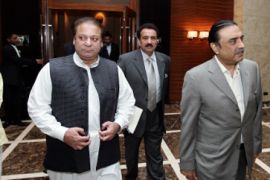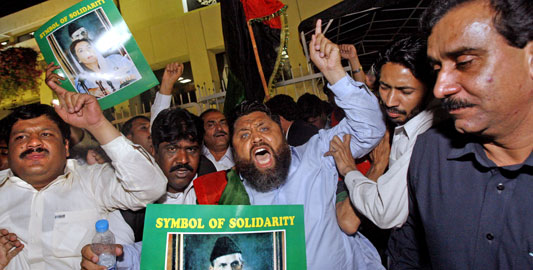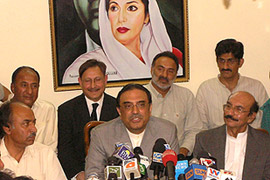Pakistan: Back to square one?
Increased political bickering harks to an era of fierce rivalries, analyst says.

 |
| Pakistanis celebrate an announcement that all detained judges, including Iftikhar Chaudhry, the former chief justice, will be released [GALLO/GETTY] |
A recent cartoon in a leading Pakistani newspaper depicted Asif Zardari and Nawaz Sharif, coalition government rulers, attempting to climb Mount Everest in hopes of finding a way to re-instate judges deposed by Pervez Musharraf, the president.
In November, Musharraf fired the judges fearing they would nullify his re-election bid.
Zardari’s Pakistan People’s Party (PPP) and Sharif’s Pakistan Muslim League-N (PML-N) had previously agreed to restore the judges within 30 days of forming a coalition government, but delays quickly arose over how to re-instate them.
The PML-N want it done through a simple parliamentary resolution but the PPP favour a constitutional amendment passed with a package of reforms.
Now, less than two months after the bitter past rivals formed the coalition — the first in the country’s 61-year history — the climb to Everest appears to be a tall order.
Signs of trouble
A political divide also surfaced amid reports of the PPP’s plan to retain the current set of judges, who were appointed under Musharraf’s tutelage.
The judges, who took oath under Musharraf’s extra-judicial Provisional Constitutional Order (PCO), are publicly scorned in Pakistan for having usurped the right of the sacked judges.
Zardari is also wary of Iftikhar Muhammad Chaudhry, the deposed chief justice who is known to be fiercely independent.
The PPP head perhaps fears that Chaudhry could investigate Musharraf’s National Reconciliation Order (NRO), which facilitated the withdrawal of decade-old cases of corruption against him and his wife, Benazir Bhutto, the slain former prime minister.
Shortly thereafter, the PPP acquiesced to Musharraf’s election in a quid pro quo.
Problems in Punjab
 |
| The PPP is trying to gain the upper hand in Punjab [EPA] |
Tensions were further exacerbated when the PPP swiftly moved to install a sworn Sharif opponent as the governor of Punjab, where the PML-N currently heads a coalition with the PPP.
Salman Taseer’s shock appointment provoked the ire of the PML-N in no uncertain terms.
Taseer has been scathing of the PML-N leader over the years and in one recent TV programme said that “Sharif had no brains”.
And in a further jab at the PML-N, Taseer said at his swearing-in ceremony last week that he would turn Punjab into a PPP stronghold and even have Bilawal, Zardari’s 19-year-old son, elected from the province.
Nisar Ali Khan, a top Sharif aide, complained that his party had not been consulted and blamed Musharraf for the move.
“Musharraf is conspiring against the public mandate. Taseer’s past is very controversial. He is not a suitable person for the office,” he said.
What next?
| The people of Pakistan voted for change. What they are getting is more of the same” |
To make sense of what the future holds, it is imperative to look at the interests of the key players in the unfolding drama — namely, Musharraf, Zardari, Sharif, the Pakistani Army.
The bone of contention in all of this is the deposed judiciary, which will make or break power equations, but US interests also play a critical role.
Conventional wisdom in Pakistan holds that the US would rather Chaudhry not be re-instated because he could re-open cases of missing persons, dozens of whom were handed over to the Americans on mere suspicion of links with Taliban.
The divisive issue of the judiciary is also leading to the creation of new political alignments.
Zardari and Musharraf are working to fill the breach left by the PML-N, which has also vocally opposed the manner in which the US has pursued the war on terror.
Musharraf, whose own future remains clouded, is working hard to isolate Sharif, who has been calling for the ex-general’s head.
Musharraf deposed and exiled Sharif in a military coup in 1999 before Saudi Arabia intervened to facilitate his return last year.
Of all the stakeholders, the army’s inclination is not yet known even though General Ashfaq Kayani, who succeeded Musharraf as its chief, has pledged to remain apolitical.
With a showdown between the Zardari-Musharraf combine and one uniting Sharif and the lawyers imminent, Pakistanis are hoping that the army will know where to draw the line.
Ayaz Amir, a prominent newspaper columnist, says Pakistanis are beginning to feel betrayed by their politicians.
“Somehow happiness does not last very long in our climate. The euphoria sparked by the February 18 election has already evaporated. The people of Pakistan voted for change. What they are getting is more of the same,” he said.
The writer is News Editor at Dawn News, an independent Pakistani TV channel.
The views expressed by the author are not necessarily those of Al Jazeera.